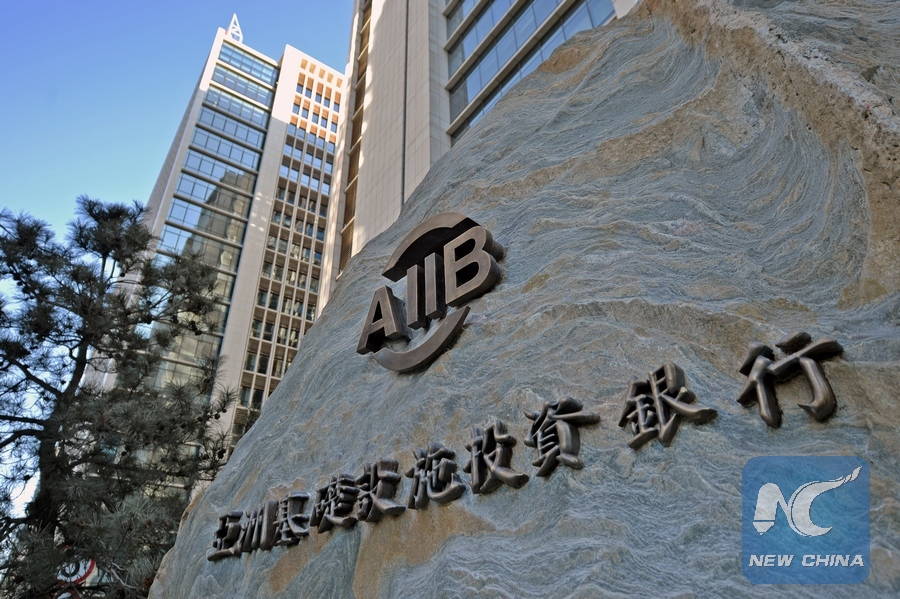
Photo taken on Jan. 17, 2016 shows the stone monument in front of the headquarters building of the Asian Infrastructure Investment Bank (AIIB) in downtown Beijing, capital of China. (Xinhua/Li Xin)
by Peter Barker, Gui Tao
LONDON, Jan. 15 (Xinhua) -- A leading British academic has called for a reordering of international institutions to more accurately reflect the changing economic and political dynamics of the 21st century.
Robin Niblett, the director of Chatham House in London, told Xinhua in a recent exclusive interview that a reform of these institutions was a benefit that should be pursued.
Several of the most important global economic institutions have their foundations in the post-Second World War settlement agreed by the victorious Western allies.
These institutions, such as the International Monetary Fund (IMF) and the World Bank, are part of the collectively known Bretton Woods institutions, and hold key positions in the global economic order.
"The fact that the United States and Europe collectively hold 50 percent of IMF voting rights is an aberration that should be changed," said Niblett.
The IMF decided in 2010 upon significant reforms to reflect the fact that emerging market economies now represented far more of the global economy than they did even at the turn of the century.
At the turn of this century, then-Goldman Sachs economist Jim O'Neill presciently identified the BRIC nations (Brazil, Russia, India, China) as emerging economies whose growth would propel them into the front rank of nations and be the driver of global growth for the 21st century.
In an interview with Xinhua late last year, O'Neill said that the successful growth of those economies in the first 10 years of the century had surprised even him.
So, the IMF was reacting to changes which were already well underway, and at the beginning of 2016 it implemented the 2010 reform package.
Those reforms saw China become the third largest member country in the IMF, and there are now four emerging market dynamic economies (Brazil, China, India, and Russia) among the 10 largest shareholders in the fund.
A further round of reforms is under review.
"There needs to be a long-term path that is more active than it has been so far to re-balance voting in the IMF institutions towards the countries that now compose a much larger element of the global economy," said Niblett.
MULTILATERAL COOPERATION
A broadening of the composition of multilateral institutions can be beneficial for all concerned, Niblett believed.
China is implementing its Belt and Road initiative.
Under the initiative of the Chinese government, the Asian Infrastructure Investment Bank (AIIB) has been set up as an international development bank.
Niblett welcomed such initiatives, and saw the foundation of the bank and its current and future operations as opportunities to enter into collaboration with other development banks and institutions to promote beneficial projects.
The head of the world-leading think tank said he was an advocate of a "decentralized form of multilateralism" that would see the AIIB work hand-in-hand with other banks.
Niblett said it would be good to see the "AIIB teaming up with the Asia Development Bank (ADB) and World Bank ... on Belt and Road, this would be an example of the kind of more open architecture I would advocate."
He said he was very comfortable with the idea of regional multilateral organizations coming together more deliberately and actively to try to promote growth in the respective regions.
"So, great for China or even AIIB to do something with the European Bank for Reconstruction and Development(EBRD) in North Africa, great for the EBRD or the ADB to team up with the World Bank or AIIB to do stuff in North East Asia," Niblett said.
With the Donald Trump United States presidency, Niblett saw little opportunity for reform of international bodies such as the United Nations, where the status quo of the five permanent members of the Security Council was likely to continue.
In addition, the Trump presidency seemed likely to herald a period of uncertainty in international affairs. The possibility of some catastrophic event -- such as a terrorist attack on the United States -- would place pressure on Trump to react.
"I think it could make America extremely unpredictable," said Niblett.
Against such a background of uncertainty and competition at state level, it is towards multilateral organizations that Niblett looks for examples of nations profiting through cooperation over the coming few years.

